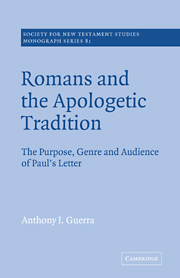Book contents
- Frontmatter
- Contents
- Preface
- List of abbreviations
- 1 Apologetic and audience: making the message meet
- 2 Apologetic motifs in Romans 1.18–3.31
- 3 Romans 4: the continuation of apologetic argumentation
- 4 Paul recommends and defends the gospel of God
- 5 Romans 9–11: Paul defends his mission to the Gentiles for the sake of the Jews
- 6 Romans 12–13 and 16: the “Roman factor”
- 7 Summary and conclusion
- Appendix
- Glossary
- Select bibliography
- General index
- Index of modern authors
2 - Apologetic motifs in Romans 1.18–3.31
Published online by Cambridge University Press: 17 August 2009
- Frontmatter
- Contents
- Preface
- List of abbreviations
- 1 Apologetic and audience: making the message meet
- 2 Apologetic motifs in Romans 1.18–3.31
- 3 Romans 4: the continuation of apologetic argumentation
- 4 Paul recommends and defends the gospel of God
- 5 Romans 9–11: Paul defends his mission to the Gentiles for the sake of the Jews
- 6 Romans 12–13 and 16: the “Roman factor”
- 7 Summary and conclusion
- Appendix
- Glossary
- Select bibliography
- General index
- Index of modern authors
Summary
Many commentators on Romans have considered Romans 1.18–3.20 to be a digression. Perhaps this is a reasonable construal if the audience of Romans is understood to be composed entirely of Gentile Christians. But if, instead, Paul is addressing Jewish as well as Gentile Christians with the primary intention of promoting harmony between these two groups of Christians, then this section of Romans is both appropriate and even essential for accomplishing his purpose in Romans. Paul declares that the distinctions between Jews and Gentiles are irrelevant from the most important perspective, that of God; both Jews and Gentiles are without merit before God. The negative task of destroying the false bases of pride that divide Jews and Gentiles is propaedeutic to fostering the new community of Jewish and Gentile Christians. Thus in this section of Romans, Paul makes frequent use of σύγκρισις which, as already pointed out, is characteristic of the Protreptic. In addition to this generic feature, the material content of Romans 1.18–3.31 can be seen in large part to be expressive of the motifs characteristic of the apologetic literature surveyed in chapter 1 and indicative of this literature's Protreptic thrust as evidenced especially by Paul's concern to demonstrate his gospel's continuity with Scripture.
Günther Bornkamm on Romans 1.18–3.31
The case that the apologetic tradition is a significant contributor to Romans 1.18–3.20 was first cogently argued by Günther Bornkamm.
- Type
- Chapter
- Information
- Romans and the Apologetic TraditionThe Purpose, Genre and Audience of Paul's Letter, pp. 43 - 101Publisher: Cambridge University PressPrint publication year: 1995



